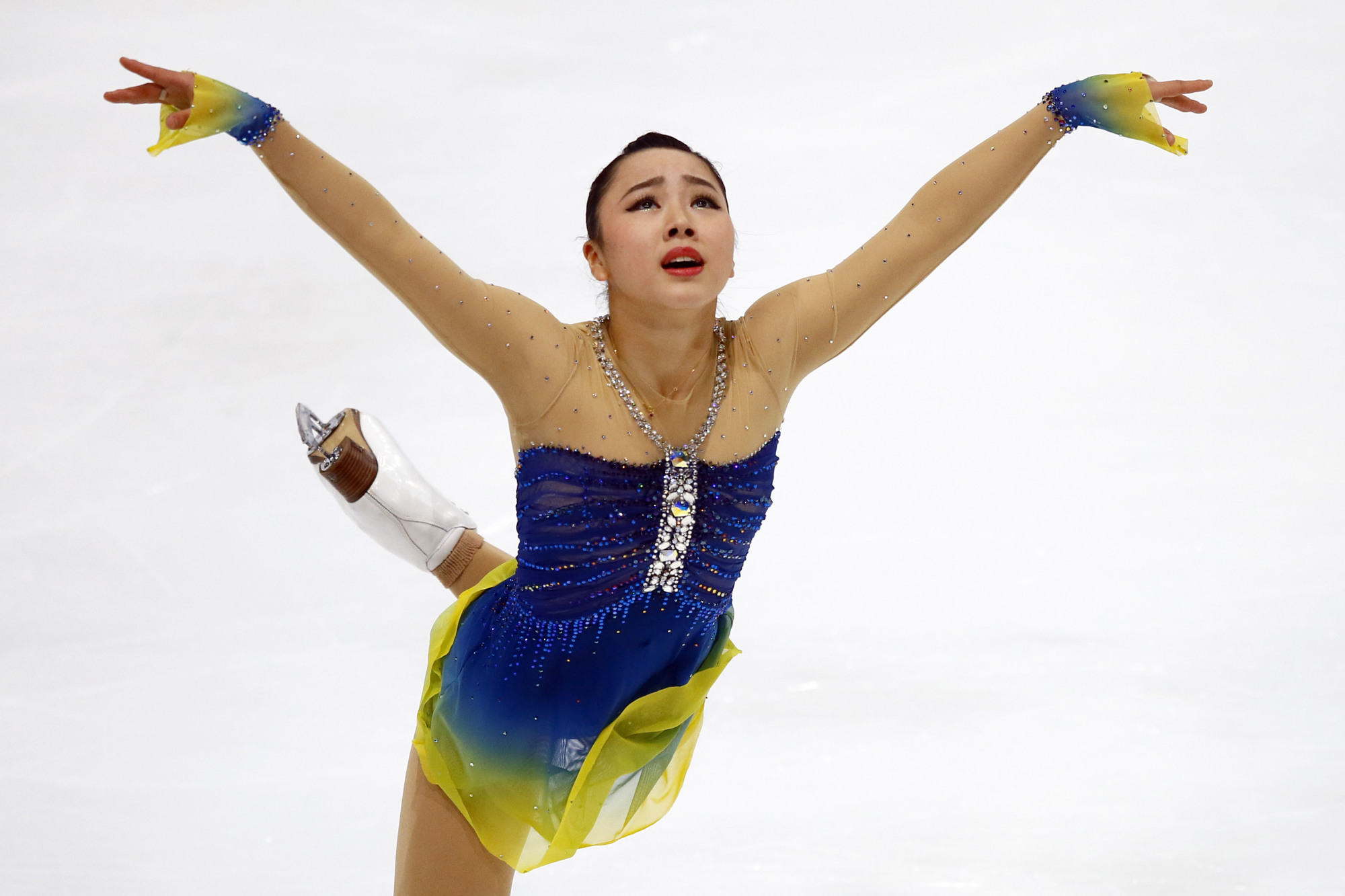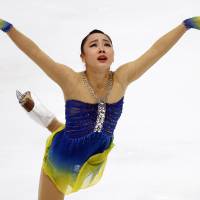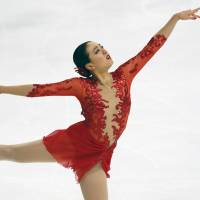Wakaba Higuchi made a successful senior Grand Prix debut by taking the bronze medal at the Trophee de France in Paris on Saturday. The 15-year-old moved up from fifth after the short program to make the podium behind reigning world champion Evgenia Medvedeva and Maria Sotskova of Russia with a solid free skate.
The skating community has been anxiously awaiting Higuchi's senior debut after she placed second at the Japan nationals last season behind Satoko Miyahara at 14. Higuchi, who won the Lombardia Trophy in the Challenger Series in September in Italy, did not disappoint in France, impressing observers with her skating skills and interpretation.
"I think we have seen another glimpse of the future," stated Eurosport announcer Simon Reed, after Higuchi's short program to " La Califfa" on Friday. "Just 15 years of age. How on earth did she get that strong at 15? And mentally strong, too."
Reed's fellow analyst on Eurosport was moved by Higuchi's presentation skills in the short program, where she wore a stunning blue outfit with yellow trim.
"You could really see an expresiveness and an emotion that you don't always see from the Japanese skaters, who at times can be quite reserved in the way they convey their expression."
The analyst particularly praised Higuchi's landing on her double axel.
"Look at the soft knee," he observed. "This is what the judges will love to see, the depth of the knee which facilitates that long, running edge on the outgoing part of the jump."
If Higuchi had not missed her planned triple flip (doubling it) in the short program, thus receiving no score for the element, she very well could have finished second behind Medvedeva.
"This is my first senior Grand Prix and I was aiming for the podium," Higuchi was quoted as saying by the ISU website. "I am happy that I achieved that."
"The Japanese federation must recognize that this is a lady who is a star for the future," said Reed's partner.
"Just amazing — the maturity. She is going to be phenomenally good," added Reed. "Just watch for her in Pyeongchang in 2018."
The possibility that Higuchi, who was third at the Japan nationals two seasons ago at the tender age of 13, could win the title this season is not only not a stretch, it is a real possibility.
Following Higuchi's free skate to "Sheherazade" on Saturday, a Eurosport commentator was wowed by the Tokyo native's poise and condition.
"The youngest competitor here in Paris and it just doesn't show at all, does it? A staggering level of maturity. A staggering level of stamina and physical conditioning."
Higuchi's total score in Paris was 194.48, a personal best.
"I just love her jump technique. So solid," commented Nagano Olympic champion Tara Lipinski about Higuchi on NBC's telecast of the Trophee de France.
Fellow NBC analyst Johnny Weir, a three-time U.S. champion, was enthralled with Higuchi's performance in the free skate.
"She really compartmentalizes each jump and unfolds from the jumps so beautifully," noted Weir. "What I really love about Wakaba's skating is that she really emotes through her face, her neck, her shoulders. There is so much expression."
Meanwhile, three-time world champion Mao Asada hit a new low in France, finishing ninth. It was the poorest result in a GP event in her illustrious career (22 competitions).
Not qualifying for the GP Final is one thing, but there is now the very real chance that Mao might not even make Japan's team for the world championships this season. Japan has three spots for the women at worlds, but unless Mao turns matters around quickly, she will be watching the competition on TV.
Mao's problems began in the short program, where she placed eighth, and continued in the free skate, where she took 10th. The question that the experts are asking now is whether this is just a blip on the radar or the new reality for Mao.
"She may be a three-time world champion, but now she is not a world beater," observed Reed after Mao's short program.
It has been painful to watch Mao, who was sixth at Skate America last month, for fans and media alike so far this season. What is even sadder is hearing analysts feeling pity for her.
"It's sad to see somebody who is a legend of her sport suffering scores that are so much lower than in the past," said Reed's fellow analyst after Mao's short program.
In the free skate, Mao landed just one clean triple jump (a triple loop). To say this was shocking would be a gross understatement.
Just to put it in perspective, Mao (161.39) finished more than 33 points behind Higuchi in the final standings.
Ice Time consulted an international skating expert for their take on Mao. The analysis is very precise, while the outlook appears grim.
"Mao certainly can still compete at the top 10 level but it is very difficult (but not impossible) for her to compete for podium," the expert wrote in an email, offering two scenarios to illustrate their points.
The first scenario:
"Mao skates clean with or without a clean triple axel.
"She is such a beautiful skater and performer that with a clean skate technically even though her jumps are not as good as others in basic quality she would do very well because of her component scores and quality of skating.
"She would have to have a perfect skate without any hint of a technical error. She would have to be emotionally engaged and bring the audience to her cause and get all level-four spins.
"In this case she would compete in the top group and even perhaps grab a medal if it was a Grand Prix event with only so many skaters. However, if this would be a world championships I would suggest best would be somewhere between 10th and fourth."
The second scenario:
"Mao makes mistakes.
"This is the case right now and you see where she is placing.
"You can not compete against the younger ladies who may not be as mature but technically stronger and have better technique.
"You also see a disheartened Mao when she is unable to produce what she used to be able to do."
The expert then described possible reasons for Mao's showings during the GP season.
"The wear and tear on the body after so many years. Her technique although OK especially when she was younger and a bit smaller now is a bit of a problem.
"She is not a big jumper and rotates a bit slower than other ladies.
"She picked on the flip and lutz a bit too far to the inside resulting in squaring off her body on the takeoff and being wider as she lifts onto the air, which results in slower rotation. Once she pulls in tight she rotates fast but often times it is too late.
"She has matured and the strength/weight ratio might be slightly different than when she was younger.
"The emotional burden of caring a nation's hope on her shoulders. She seems like such a lovely and caring person that every time she under-performs there must be some sort of emotional drain."
Orser's observations: Brian Orser, the coach of both Olympic champion Yuzuru Hanyu and world champion Javier Fernandez, spoke to Ice Network's Jean-Christophe Berlot recently about the challenge of motivating the two and had some interesting comments.
"I try to present things so that they become their ideas," said Orser. "When I see that the stars and moon are lined up, I feed the idea in, and then I let them take ownership of it. I prefer doing it that way rather than me saying, 'You should do this.' . . ."
Orser pointed out that Hanyu and Fernandez have different approaches at this point in time.
"Those guys are in such good shape," Orser stated. "Actually, they have a different strategy. Yuzu is still very young (he turns 22 on Dec. 7), and he feels like he needs to push the sport forward. Javi has a different mindset. He will be 26 at the next Olympics. He is quite content with what he has now. . . ."
Orser told Berlot that Hanyu is prioritizing his quad jumps this season.
"Yuzu is very focused on his quads at the moment," Orser said. "There are six quads in his two programs this season, two of which are quad loops (one in the short and one in the free). He has really stepped it up technically this season. . . ."
Next up: The GP circuit travels to Beijing this week for the Cup of China. Mai Mihara and Rika Hongo will skate for Japan in women's singles. Daisuke Murakami had been scheduled to be the lone male representative for the Hinomaru, but has withdrawn with a foot injury.
Mihara, who has enjoyed a fine season with a victory at the Nebelhorn Trophy in the Challenger Series and a third-place finish at Skate America, and Hongo will take on a field that includes world silver medalist Ashley Wagner, as well as Russia's Elena Radionova and Canada's Kaetlyn Osmond.
Loaded lineup: Ice Time will be on the scene in Sapporo this weekend to provide coverage of the Japan Junior Championships at Tsukisamu Gymnasium.
This season's competition is expected to be especially intense, with the likes of reigning world junior champion Marin Honda, Rika Kihira, Kaori Sakamoto, Yuna Shiraiwa and Mako Yamashita all scheduled to participate. All of these skaters have enjoyed success on the international level.
Honda, Sakamoto and Shiraiwa are likely contenders for Japan's Olympic team for the 2018 Pyeongchang Games. Higuchi was Japan's junior champion in each of the past two seasons, before moving up to the senior ranks this campaign.



















With your current subscription plan you can comment on stories. However, before writing your first comment, please create a display name in the Profile section of your subscriber account page.